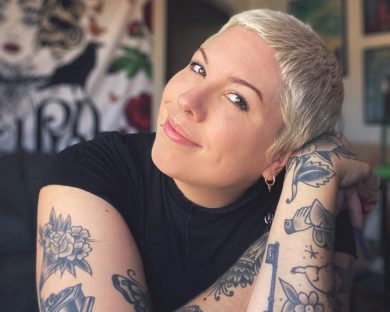Laurence Lebel is blooming in the musical spring with the speed of a cherry tree. “I was given the keys to a label and to the management aspect of things, and I now oversee both departments,” she says.
 Artifice, the Québec City-based company specializing in radio promotion (notably for Louis-Jean Cormier, Les Louanges, and all the artists signed to Bravo Musique) has, for the time being, only a postal address in Montréal, and no offices. It also manages 13 artists, handles media relations for 16 more, nine directly under the Disques Artifice banner. It’s also active as a publisher and digital distributor. Lebel’s enthusiasm is obvious. “I couldn’t have asked for a better work environment,” she says.
Artifice, the Québec City-based company specializing in radio promotion (notably for Louis-Jean Cormier, Les Louanges, and all the artists signed to Bravo Musique) has, for the time being, only a postal address in Montréal, and no offices. It also manages 13 artists, handles media relations for 16 more, nine directly under the Disques Artifice banner. It’s also active as a publisher and digital distributor. Lebel’s enthusiasm is obvious. “I couldn’t have asked for a better work environment,” she says.
Although she’s new to the field of artist management, the contracts she takes on are based on the human touch, above all. “There’s a whole personal side to manage beyond digital strategies,” she says. “About 95 percent of my personal and professional decisions are based on instinct, on the little voice inside me.”
Those who know her have all been struck more than once by her radiant smile, her communicative laughter, her proverbial good humour. Arriving from Sherbrooke in 2010, Lebel has been active in many aspects of the Québec music industry.
“Finding work in the music biz isn’t easy; everyone wants to work in that industry,” she says. “It can be upsetting when you struggle to find your place; I was anxious, and I even thought of leaving everything and getting a degree in human resources. My greatest quality? I’m very resilient. Biggest flaw? Letting go.”
At 33 years old, in a Montréal-based music ecosystem comprised of journalist friends, podcasters, behind-the-scenes employees, broadcasters, press agents – her “gang,” as she calls it – Lebel is one of the faces of a generation for whom the promotion of emerging Francophone music is a passion.
“I’m always at record launches, like everyone else, trying to see what partnerships are possible with my projects,” explains the music lover. And how are prospects recruited? A question of flair, of course, but there must be something more to it…
“With [the band] Super Plage, who we signed last summer, we met during three months to get to know each other, hanging out in parks drinking bee,r and following the evolution of their musical project,” says Lebel. “For the marketing strategy of the album Super Plage 2, we absolutely wanted to opt for YouTube in the 10 days preceding the release of the album, a new song being unveiled each day – which increases the traffic on the platform. It’s always a question of tone, and not losing the true nature of the project. There are artists who experience a lot of difficulties with social platforms, and others who embrace them. I always tell musicians, ‘Don’t force it if it doesn’t come naturally.’’
Lebel got her first job in music in the punk section at HMV. Her mother, the illustrious country singer Renée Martel, daughter of the legendary Marcel Martel, had this philosophy for her own daughter: “She didn’t want to introduce us to her world (showbiz) unless my brother and I asked,” says Lebel.
In Montréal, she landed a position at the student radio station CISM, managing volunteers and programs. A year later, she signed a four-year contract with SOPROQ, the collective management society for the rights of producers of sound recordings and music videos. “That’s where I learned about metadata. and the whole background of a song,” says Lebel.
She then moved to Believe Digital and Dep, where she was in charge of distribution, an adventure that lasted four years – until the latter declared bankruptcy. Three weeks later, she started a new job at Audiogram in digital marketing. “It was my first experience at a record label,” says Lebel. “At first I didn’t want to work for a single brand and only identify myself with its artists, except Audiogram. My father and I listened a lot to the music by Lhasa, Pierre Lapointe or Daniel Bélanger – they rocked my childhood – so it was like going back to my roots.”
She stayed there just short of two years. “I don’t have a Bachelor’s degree in Communications, or web training, I learn as I go,” says Lebel. “I was going from job to job because I’m easily bored, if I’m not stimulated by new things, and I can’t take on new projects. The more time went by, the more I became interested in artist management. By that time, I knew I’d learned everything there is to know about managing socials.”
Catherine Simard, who’d just founded La Maison Fauve, took Lebel under her wing to help with the marketing and management coordination of Eli Rose. Eight months later, filled with certainty about her future in management, Lebel left with the firm intention of starting her own company to work on her own projects.
Finally, at the end of March 2020, in the middle of the pandemic, Laurence was officially hired by the President of Artifice, Alex Pouliot.
What does her mother think of Lebel’s career path? “When I started working in the industry, I often heard, ‘Oh, you’re Marcel’s daughter!’ Today, it’s, ‘Oh, You’re Laurence’s mother!’” she says, laughing.
“It makes her laugh because when she does TV appearances, she meets musicians, journalists, or researchers who know me,” says Lebel. “She’s very proud of my background, and of the fact that I didn’t play the ‘daughter of’ card.”